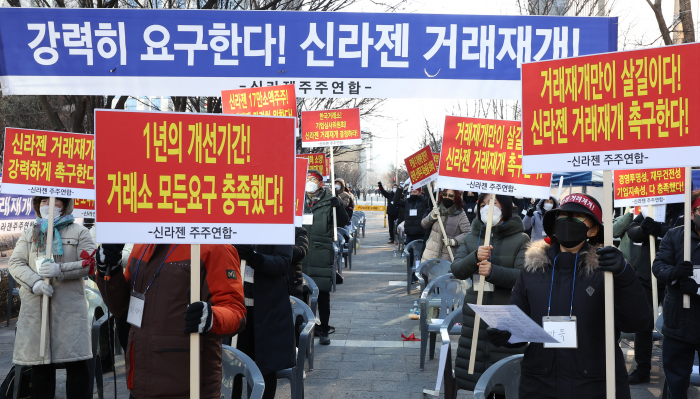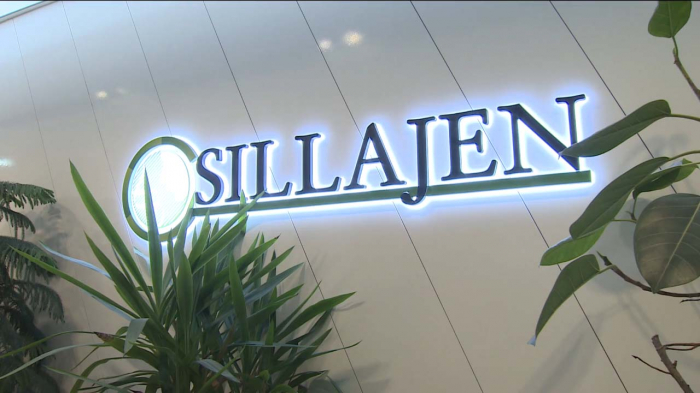Scandal-hit SillaJen faces higher delisting risk
Korea Exchange tentatively decides to delist SillaJen from Kosdaq; a lengthy process seen until a final decision
By Jan 19, 2022 (Gmt+09:00)

South Korea's SillaJen Inc., once the largest stock on Kosdaq by market value, faces a higher risk of being kicked out of the country's junior stock market, dealing a heavy blow to hundreds of thousands of minority investors.
The Korea Exchange (KRX) on Jan. 18 tentatively decided to delist the scandal-hit biotechnology company, on the conclusion that the developer of cancer treatments failed to fulfill self-rescue plans submitted last year.
Trading of the stock has been suspended for 20 months, after its top management was indicted on charges of embezzlement and breach of trust. Its former Chief Executive Moon Eun-sang was accused of selling the company stock using insider information gleaned from the halted clinical trials of its anti-cancer drug. He was arrested in 2020.
Additionally, a number of SillajenŌĆÖs former employees were accused of pocketing heavy gains by exercising stock options before its trading was suspended.
As part of self-rescue measures, SillaJen in July of last year raised 100 billion won ($84 million) in rights offering to M2N Co., a Kosdaq-listed company of metal shipping drums.┬Ā
But a KRX official said its declining pipeline of new drug candidates added to uncertainties over its corporate value.
Once dubbed as a choice of stock by individual investors nationwide, the biotech firm is 92.6% owned by 174,186 minority investors as of end-September, 2021.
It closed at 12,100 won with a market capitalization of 1.2 trillion won, a day before its stock trading was halted on May 4, 2020.

The decision to delist SillaJen was made by KRX's corporate review committee, which needs to be endorsed by the Kosdaq market committee by Feb. 18. In the best-case scenario, the Kosdaq market committee could allow SillaJen to spend another year improving its financial conditions to avoid being delisted.
Even if the Kosdaq market committee votes to kick SillaJen out of the stock market, the company will be allowed to undergo one more formal procedure to appeal the decision.
In response to KRX's Tuesday decision, the company said its R&D and business kept running as normal and its key clinical trials proceeded as scheduled.
The lengthy process over SillaJen sheds light on some 40 Korean companies,┬Ā awaiting KRX's decision on whether to be delisted or not since 2017. Their share trading has been suspended for several years.
Among them are CN PLUS Co., an electronic parts maker; Barun Electronics Co., a semiconductor materials producer; and Kolon TissueGene Inc., once a high-flying darling of investors.
The tedious review process over their qualifications as a listed company is blamed on the exchange's excessively prudent approach: finding fault with documents and financial data submitted by companies at risk of being delisted and granting more time to supplement them, or enhance their bottom line over and over.┬Ā
Market watchers warned Osstem Implant Co., the country's top dental implant manufacturer, may have to deal with such a long-drawn-out process with the KRX.┬Ā
Its share trading has been suspended on the Kosdaq market since Jan. 3, after the company revealed itself the victim of the largest-ever embezzlement scandal for a Korean listed company, totaling 188 billion won ($160 million).
A total of 19,000 individual investors hold a combined 56% stake in Osstem as of end-September, 2021.
Despite investor complaints, another KRX official noted its lengthy review procedures were worth it. He said any hasty decision on delisting, without giving companies enough time to enhance their financial status, could inflict heavier losses on existing shareholders than expected.
Out of the 150 companies under KRX's supervision over the past five years, only 13 firms have been kicked out of the Kospi, or Kosdaq markets, according to data from the Financial Services Commission. Half of them were delisted due to embezzlement and breach of trust by their top management.
Write to Jae-Yeon Ko and So-Ram Jung at yeon@hankyung.com
Yeonhee Kim edited this article.
-
 Embezzlement scandalKorean dental implant maker hit by $160 mn embezzlement
Embezzlement scandalKorean dental implant maker hit by $160 mn embezzlementJan 03, 2022 (Gmt+09:00)
1 Min read -
 Embezzlement scandalInvestors prepare loss claim for Osstem's fraud case
Embezzlement scandalInvestors prepare loss claim for Osstem's fraud caseJan 06, 2022 (Gmt+09:00)
4 Min read -
 Once high-flying bio stock hit by financial scandal
Once high-flying bio stock hit by financial scandalOct 21, 2020 (Gmt+09:00)
3 Min read




